
The 10 Best AI Research Assistants for Academics
AI research assistants are transforming academic workflows by simplifying literature discovery, citation management, and paper summarization. These tools save time and improve research quality by automating tedious tasks like finding relevant studies, formatting citations, and synthesizing dense academic content. Whether you're a student or an experienced researcher, these tools can help you stay on top of the ever-growing volume of academic publications.
Here are 10 top AI tools for academic research:
- Sourcely: Quick literature discovery, citation generation, and PDF access. Pricing: $7 (trial), $17/month, $167/year, or $347 lifetime.
- Yomu AI: Summarizes papers and integrates research, writing, and citing in one platform.
- Zotero AI: Suggests sources, formats citations, and integrates with word processors.
- EndNote AI: Auto-detects citations, removes duplicates, and syncs across devices.
- Scite Assistant: Evaluates citation context with color-coded insights.
- Scholarcy: Summarizes papers and extracts references for deeper analysis.
- Iris.ai: Connects to databases for targeted literature searches and integrates with other tools.
- Elicit: Automates literature reviews and organizes data into comparative tables.
- SciSpace: Links 150+ databases and integrates with tools like ChatGPT.
- Recall: Builds knowledge graphs from multiple sources and organizes research.
These tools streamline academic research, allowing you to focus on analysis and writing rather than manual tasks.
AI Tools Academics SWEAR By (and the Ones to AVOID!)
1. Sourcely
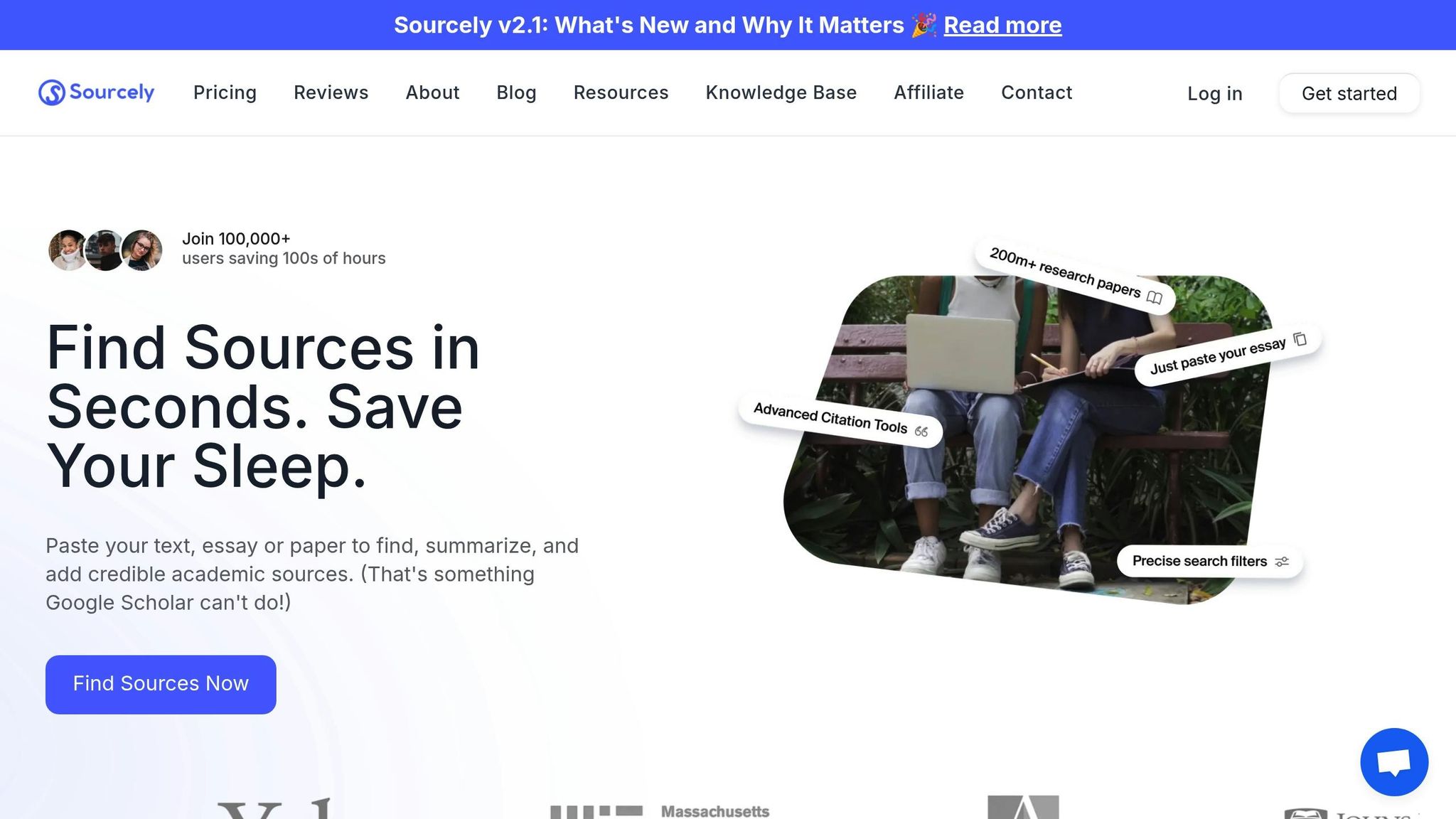
Sourcely is an AI-powered research assistant designed to simplify academic literature discovery and citation management. It tackles one of the biggest challenges in academic research: finding credible sources and formatting citations efficiently. Here's a closer look at how Sourcely supports researchers in these areas.
Literature Discovery and Sourcing
With Sourcely, all you need to do is paste your research topic into the platform. The AI immediately identifies citation needs and locates credible academic papers. You can refine your search using filters for peer-reviewed articles, specific time frames, or disciplines. Sourcely also provides access to free PDFs and integrates with Google Scholar, giving users a wide range of academic publications to build a strong foundation for their research.
Citation Management and Bibliography Creation
Forget the hassle of manually formatting citations. Sourcely automatically generates citations in popular formats like MLA, APA, BibTeX, Harvard, and IEEE. It even creates summaries of academic papers, helping you quickly evaluate sources and streamline the early stages of your literature review.
Integration with Academic Workflows
While Sourcely doesn’t offer direct API integration with word processors like Microsoft Word or Google Docs, it makes up for it with easy-to-use export options. These allow you to transfer formatted citations seamlessly into your preferred writing tools or citation managers.
Sourcely’s pricing includes several tiers: a trial option with 2,000 characters for $7, a monthly subscription for $17, an annual plan at $167, and a lifetime "believer" plan for $347. This flexible structure ensures options for both short-term and long-term users.
2. Yomu AI
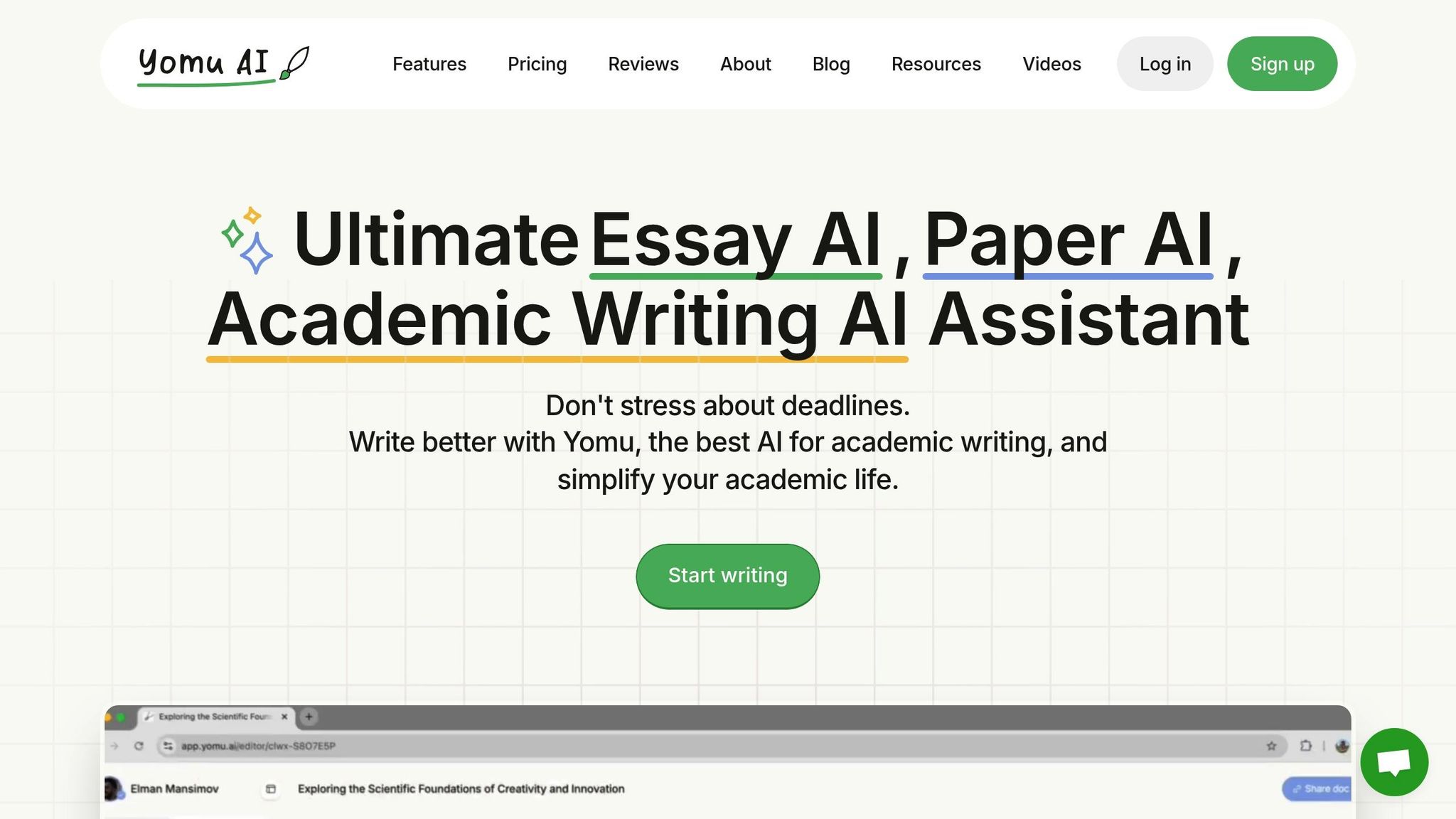
Yomu AI is designed to simplify the often overwhelming process of academic research and writing. By combining multiple tools into one platform, it aims to make managing research tasks more efficient. Here's a look at its standout features:
Summarization of Academic Texts
Yomu AI can break down complex academic papers into clear, concise summaries. This is especially helpful for researchers in the initial stages of a literature review, saving time while still capturing the essence of the material.
Literature Discovery and Sourcing
Finding the right academic sources can be a daunting task. Yomu AI integrates literature discovery directly into its platform, allowing users to locate and cite relevant sources without switching between tools.
Integration with Academic Workflows
Yomu AI brings together researching, writing, citing, and editing in a single, streamlined interface. While it offers a free tier for basic needs, premium options unlock advanced features for those seeking more robust capabilities.
3. Zotero AI
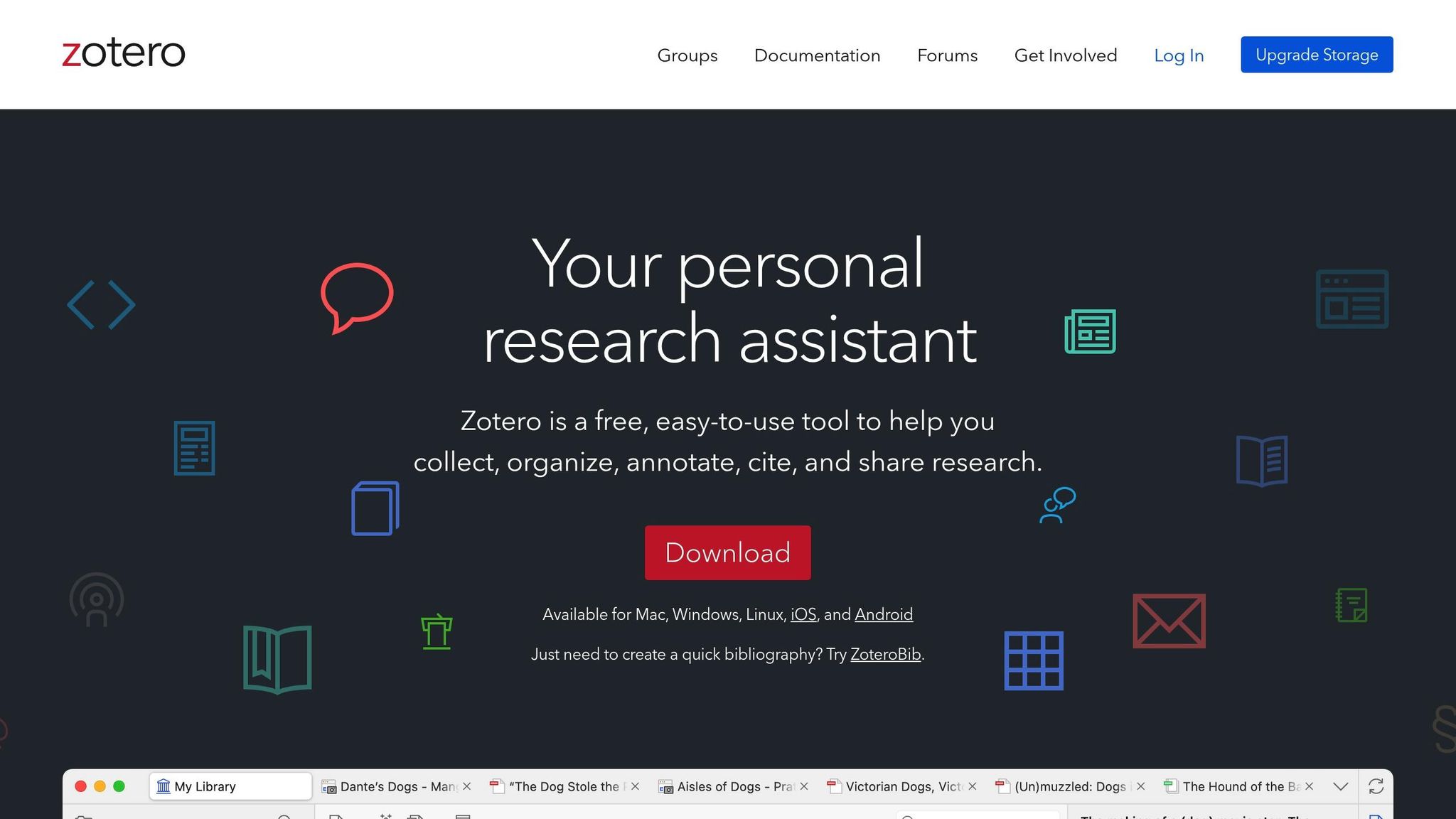
Zotero AI simplifies the research process by blending traditional reference management tools with the power of artificial intelligence. It tackles common challenges in citation management, source discovery, and content analysis, making it an invaluable tool for researchers.
Citation Management and Bibliography Creation
With Zotero AI, bibliographic data is captured automatically, and citations are formatted for you - no need for tedious manual adjustments.
Literature Discovery and Sourcing
Zotero AI analyzes your research library and focus areas to suggest additional sources, helping you refine and expand your literature review with ease.
Integration with Academic Workflows
Zotero AI integrates seamlessly with widely used word processors like Microsoft Word, Google Docs, and LibreOffice. This makes inserting citations and organizing references a breeze, especially when collaborating on research and writing projects. It ensures your workflow stays smooth and efficient.
Summarization of Academic Texts
Need to quickly assess a source? Zotero AI provides concise summaries of academic texts, saving you time and effort in determining relevance.
4. EndNote AI
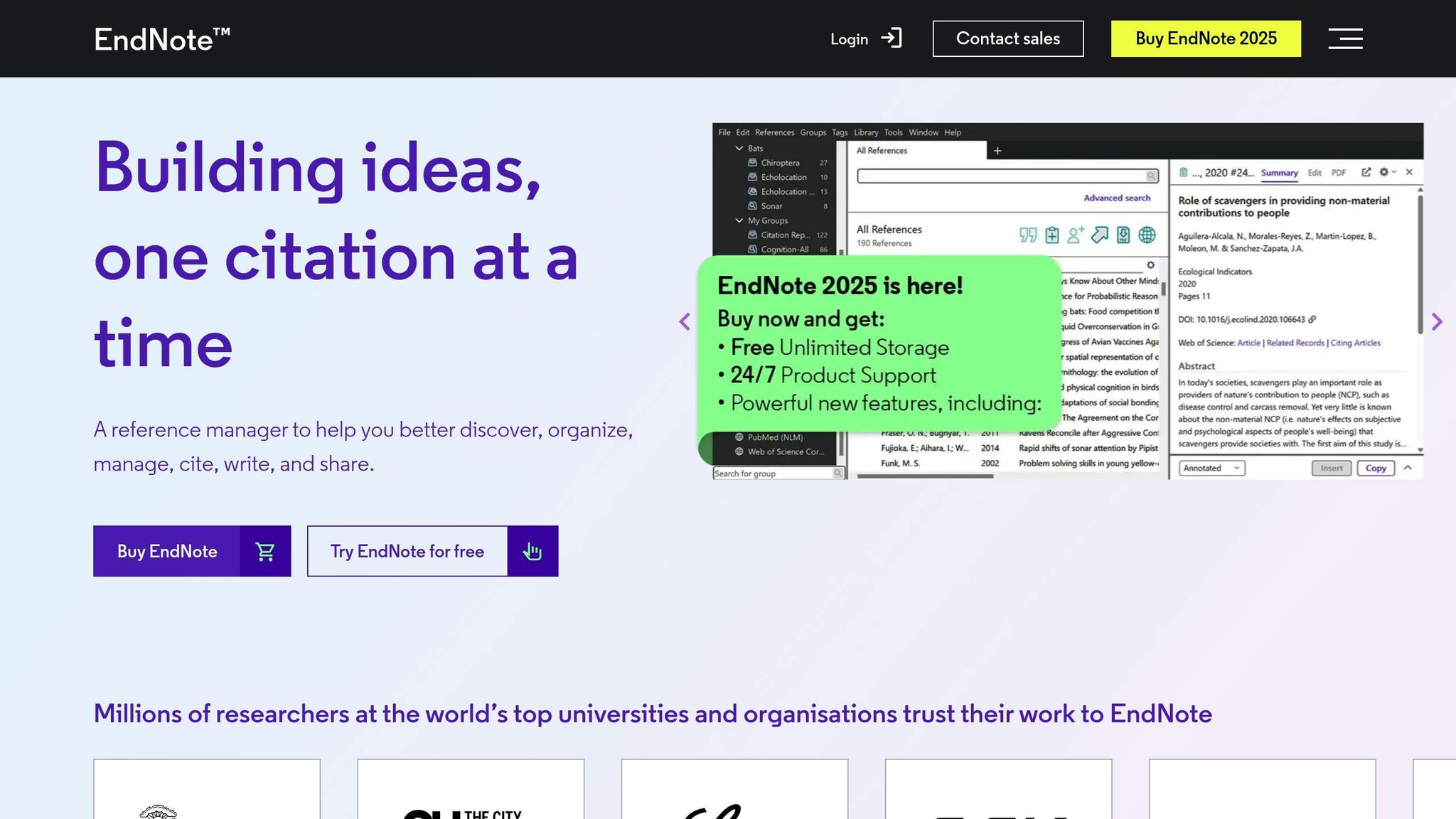
EndNote AI takes academic research and writing to the next level by building on EndNote's established features. Here's a closer look at what it offers:
Citation Management and Bibliography Creation
Managing citations can be a headache, but EndNote AI makes it much easier. It can automatically detect citations, format them in various styles, and even pull bibliographic details straight from PDFs. Plus, it identifies duplicate entries to keep your references clean and organized.
Literature Discovery and Sourcing
Finding the right research is time-consuming, but EndNote AI simplifies the process. Its natural language search helps you quickly locate relevant papers and connect with key authors in your field.
Integration with Academic Workflows
EndNote AI seamlessly works with tools like Microsoft Word, Google Docs, and LaTeX editors through its "Cite While You Write" feature. This makes it easy to prepare manuscripts, collaborate with your team using shared libraries, and sync your work across devices.
Summarization of Academic Texts
Need a quick overview of a paper? EndNote AI can generate concise summaries, giving you a snapshot of key findings and methodologies without having to read the entire document.
5. Scite Assistant
Scite Assistant stands out by providing clear insights into citation context and reliability. It analyzes the connections between studies to indicate whether later research supports or contradicts earlier findings, offering a snapshot of how a paper is perceived within the scientific community.
Literature Discovery and Sourcing
With its Smart Citations feature, Scite Assistant makes it easy to evaluate citations using a color-coded system: green for supportive citations, orange for neutral mentions, and red for contrasting views. It also allows users to filter citations by type and publication date, helping researchers quickly identify studies that reinforce their work. The platform goes a step further by using citation network analysis to suggest related papers, making it easier to find relevant studies that might not appear in typical keyword-based searches.
Integration with Academic Workflows
Scite Assistant fits seamlessly into research workflows through browser extensions and API connections. This means users can access citation analyses directly on journal websites and academic databases. It also generates detailed, shareable reports, making it a powerful tool for enhancing real-time academic research and collaboration.
6. Scholarcy
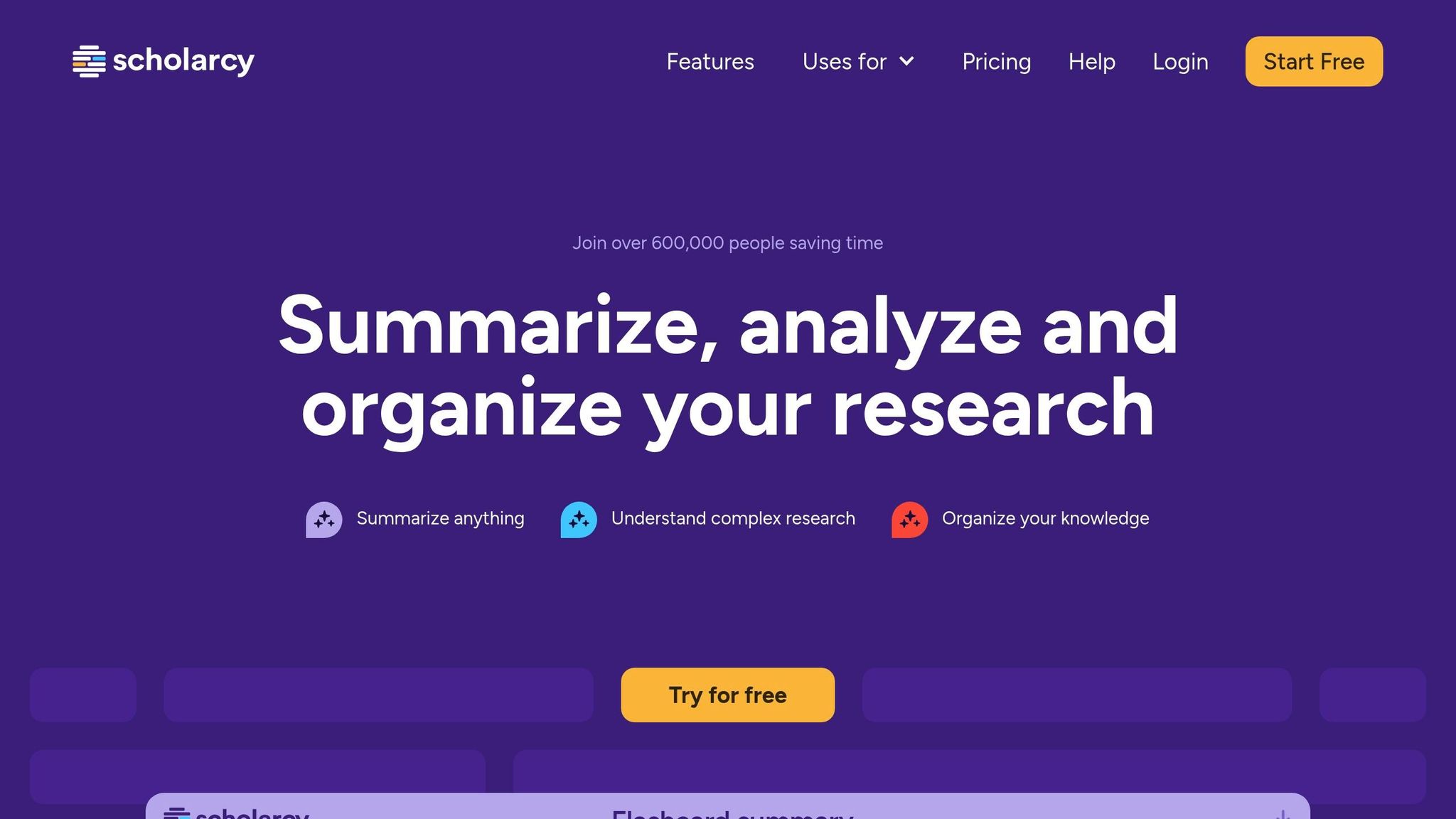
Scholarcy simplifies the often daunting task of digesting academic papers by turning them into clear, concise summaries. It’s a real time-saver for busy researchers who need to process large volumes of literature quickly.
Summarizing Academic Texts
With Scholarcy, you get structured summaries that distill the essence of scholarly papers. These summaries highlight key findings, methodologies, and conclusions, making complex information easier to grasp. It also creates flashcards with visual cues to emphasize the most important points, while identifying specialized terms to help users navigate technical language. Beyond just summarizing, it aids in exploring sources more effectively.
Literature Discovery and Sourcing
Scholarcy doesn’t stop at summaries - it takes literature discovery to the next level. By extracting and organizing cited references from academic papers, it presents them as clickable links. This feature allows researchers to dive deeper into related studies and gain a broader understanding of the research landscape.
Integration with Academic Workflows
Designed to fit seamlessly into academic workflows, Scholarcy offers flexibility through a browser extension or direct uploads. It supports batch processing of documents and provides summaries in Word or PDF formats, making it easy to adapt to different research needs.
sbb-itb-f7d34da
7. Iris.ai
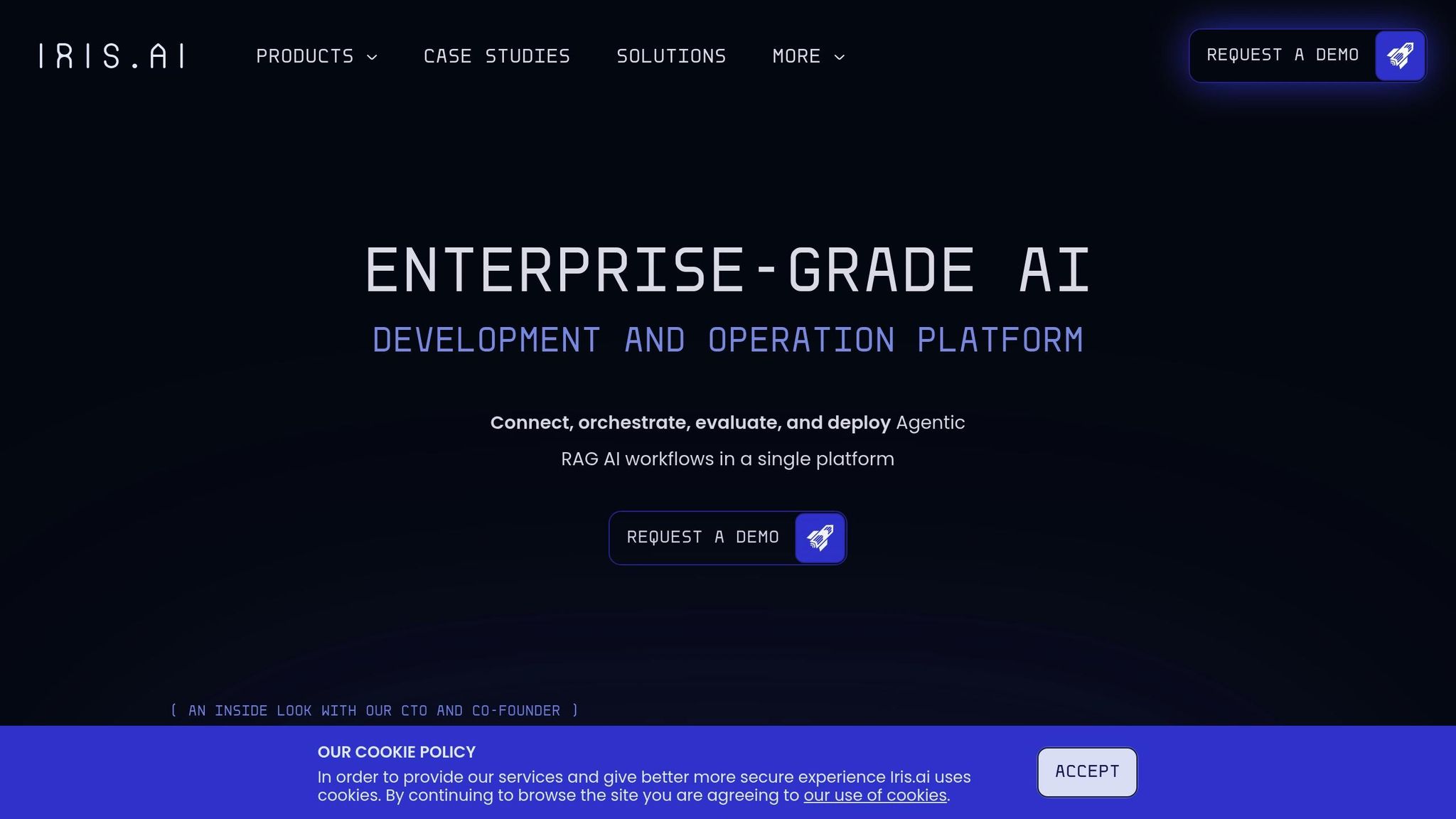
Iris.ai simplifies the way researchers navigate and analyze scholarly content, especially when dealing with large volumes of academic material. Its Researcher Workspace is built to enhance workflows, making literature exploration and organization more efficient.
Literature Discovery and Sourcing
Iris.ai connects with major academic databases, allowing researchers to quickly discover and access relevant studies and papers. This makes the process of sourcing literature faster and more targeted.
Integration with Academic Workflows
Iris.ai works smoothly with widely used academic tools like EndNote and Mendeley. It also links with project management platforms and data analysis systems, creating a cohesive research ecosystem. The platform supports various document formats, provides multiple export options, and includes API access for custom integrations. Additionally, its collaborative tools within the Researcher Workspace make it easier for teams to share findings and coordinate literature reviews effectively.
8. Elicit
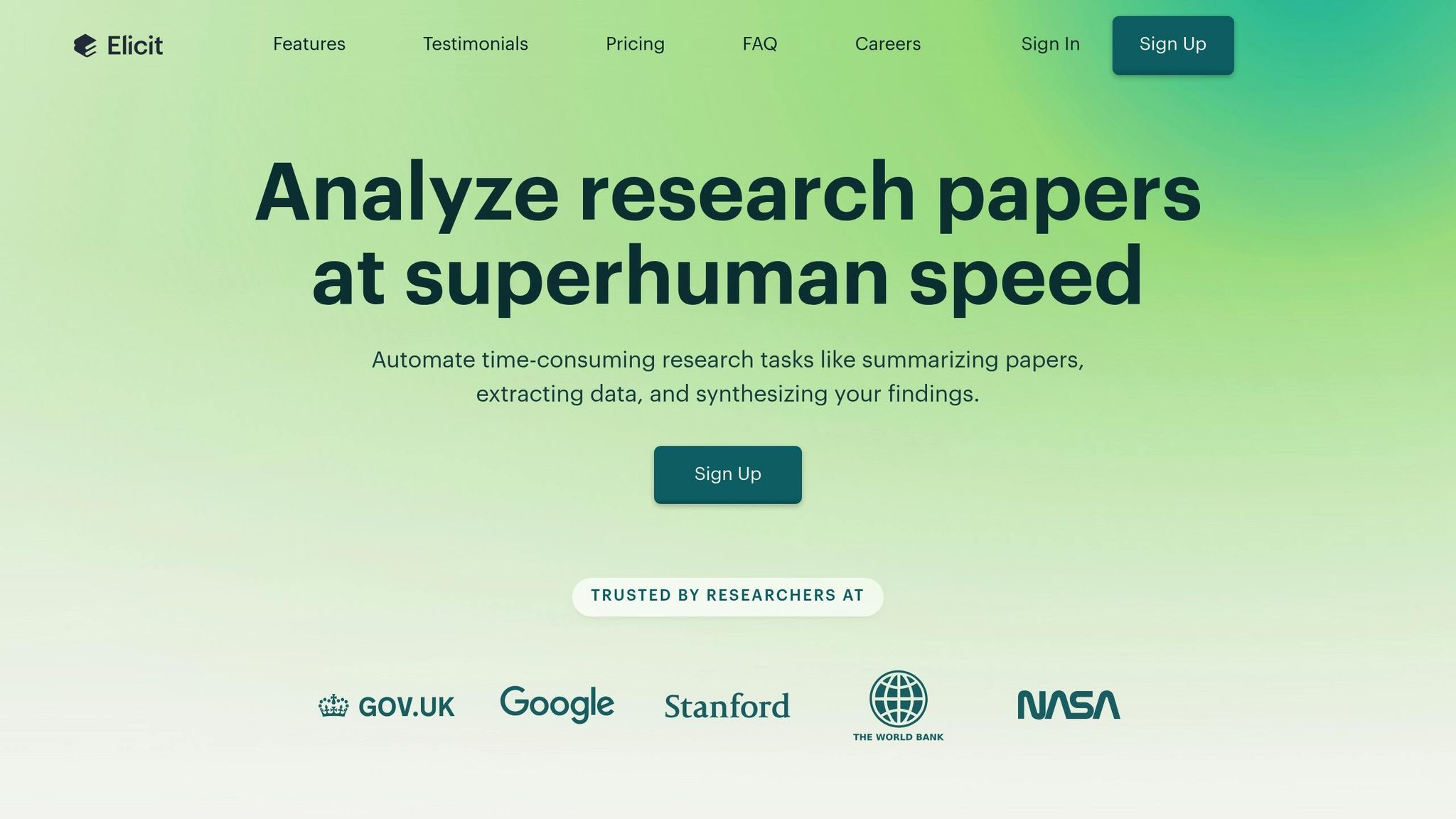
Elicit is another AI-powered tool designed to make academic research more manageable. It focuses on automating literature reviews by pulling key details from research papers and organizing them for easier analysis.
Literature Discovery and Sourcing
Elicit takes research to the next level with its advanced search capabilities. Instead of just relying on keyword matches, it interprets the meaning behind your research question to find relevant studies. This approach helps uncover papers that traditional searches might miss.
With access to a wide academic database - particularly strong in fields like machine learning, biomedicine, and social sciences - Elicit highlights studies addressing similar questions, even if they use different methods or terminology.
Summarization of Academic Texts
One of Elicit’s standout features is its ability to extract and summarize key details from academic papers. It organizes information such as methodologies, findings, sample sizes, and limitations into easy-to-digest summaries.
For added convenience, it can create custom tables to compare metrics like participant numbers, intervention types, outcomes, and effect sizes. This structured approach makes it simple to spot trends or gaps in the research.
Integration with Academic Workflows
Elicit fits smoothly into existing research processes. It allows users to export data in various formats, making it easy to integrate with reference management tools or directly into manuscript drafts. Plus, it supports teamwork by enabling groups to refine data extraction and collaborate on systematic reviews more effectively.
9. SciSpace

SciSpace is a research platform designed to simplify academic workflows. At the heart of its functionality is the SciSpace Agent, a tool that connects over 150 academic databases and tools into one interface. This makes managing research projects - everything from literature reviews to citations - much more efficient. Here's a closer look at how SciSpace supports academic research.
Literature Discovery and Sourcing
SciSpace gives researchers access to a massive repository of 280 million+ papers and 50 million+ full-text PDFs. Covering a wide range of disciplines, this database provides a solid starting point for literature reviews.
The platform is also introducing a "Browser Control" feature that will integrate popular databases like Google Scholar, PubMed, and ScienceDirect into a single search experience. No more switching between tabs to find relevant studies.
What sets SciSpace apart is its ability to process user-uploaded files and data alongside published research. This feature allows users to combine their own datasets with existing literature, creating a more tailored research workflow.
Citation Management and Bibliography Creation
SciSpace simplifies citation management by supporting formats like APA, MLA, and Chicago. It automates citation formatting, saving researchers valuable time on tedious tasks.
For those already using tools like Zotero, SciSpace makes the transition seamless by allowing users to import existing libraries. This ensures continuity for researchers with established reference collections.
Integration with Academic Workflows
SciSpace is highly adaptable to different workflows, with export options in formats like CSV, BibTeX, and Word. This flexibility makes it easy to incorporate SciSpace into existing research setups.
One standout feature is its integration with ChatGPT via a custom assistant. This pairing combines SciSpace’s extensive database with ChatGPT’s conversational interface, offering a more interactive and centralized research experience.
Collaboration is another strength. SciSpace allows teams to share resources and work on projects together. For those needing advanced features like Zotero export, Premium plans start at $20/month for 4,000 credits, making it an affordable mid-range option for researchers.
10. Recall
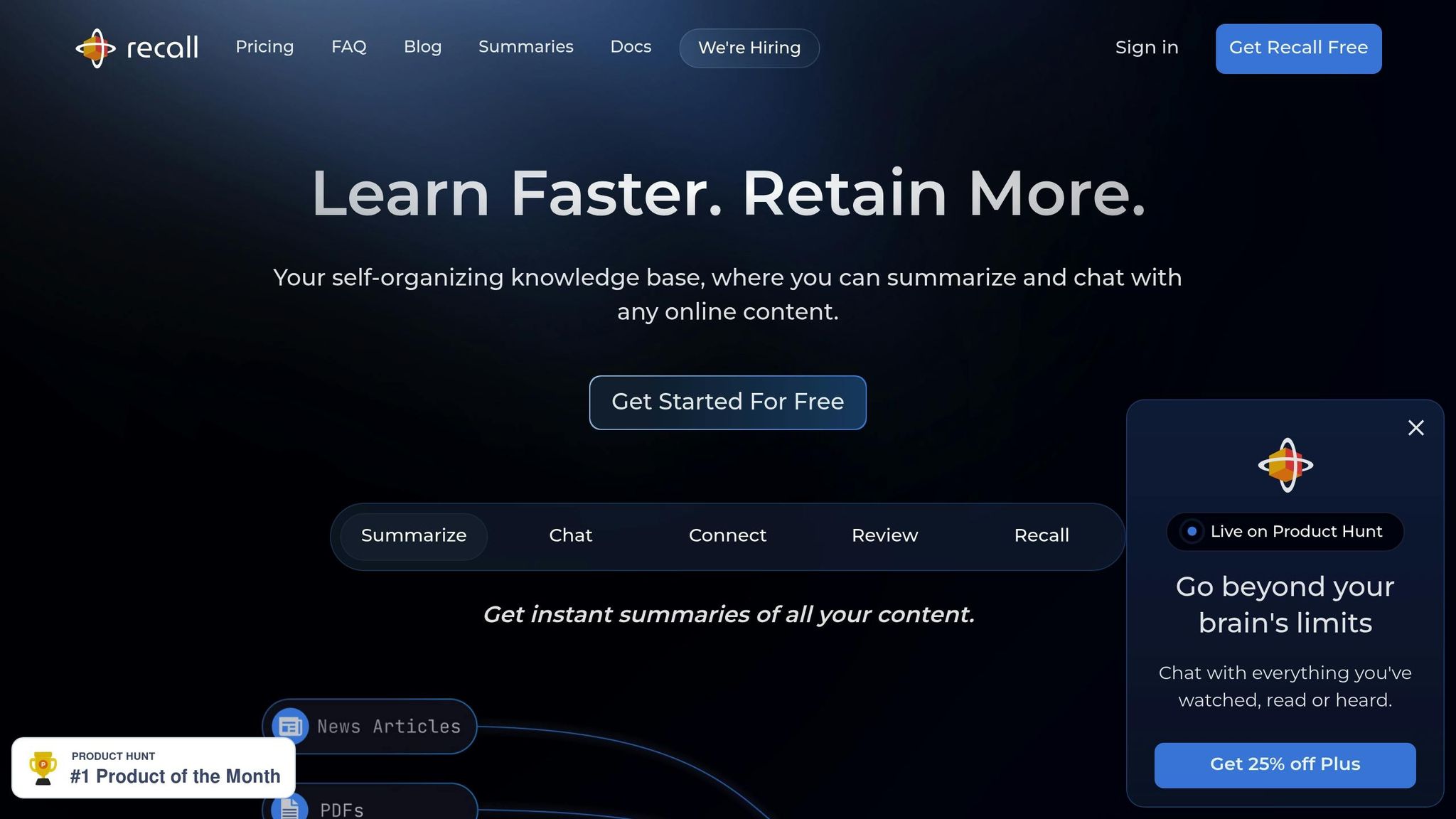
Recall takes knowledge management to a whole new level, offering researchers a smart way to gather, organize, and access information from a variety of sources. This AI-driven platform simplifies literature searches and automates knowledge organization, making it easier to build and maintain personal knowledge bases for academic work.
Knowledge Capture and Organization
One of Recall's standout features is its ability to pull information from multiple formats - think academic papers, web articles, podcasts, and videos - and organize it into searchable knowledge graphs. Using AI, the tool identifies key concepts, links related ideas, and tags content for quick access. This means researchers can skip the tedious manual categorization and focus on building a rich database of useful information.
Literature Discovery and Sourcing
Recall doesn't just store what you already know - it actively helps you discover what you should know. By analyzing your existing knowledge base, the platform suggests additional resources and pinpoints gaps in your research. Its AI-driven recommendations ensure that you find academic papers and sources tailored to your specific interests, streamlining the process of literature discovery.
Integration with Academic Workflows
This tool fits right into your workflow. With browser extensions, you can save and organize content as you browse, and its support for various export formats ensures compatibility with other research tools. For those who need more customization, Recall offers API access. Plus, its collaborative features make it easy for research teams to share knowledge bases and work together on literature reviews.
Automated Knowledge Synthesis
Recall goes beyond being a storage tool - it helps you make sense of the information you collect. By synthesizing data across sources, the platform uncovers patterns, highlights contradictions, and identifies new research opportunities. It can even generate summaries and reveal connections between studies, giving researchers a clearer understanding of complex topics with less effort.
Feature and Price Comparison
When deciding on the best AI research assistant for academic work, understanding the features and pricing is crucial. Here’s a quick breakdown of what Sourcely offers:
| Tool | Key Features | Pricing (USD) | Best For |
|---|---|---|---|
| Sourcely | AI-powered literature sourcing, essay analysis, precise search filters, PDF downloads, reference export | $7 (trial for 2,000 characters), $17/month, $167/year, $347 (lifetime) | Students and researchers needing precise source discovery |
Sourcely stands out with its flexible pricing options - whether you're testing the waters with the $7 trial, opting for a monthly plan at $17, or committing to a lifetime license for $347. Its standout features, such as AI-driven literature sourcing and the ability to match sources to pasted essays, make it a great tool for streamlining research. For students and academics aiming to refine their workflow, Sourcely offers a practical and efficient solution.
Conclusion
AI research assistants have reshaped how academics tackle literature discovery, organization, and analysis. By cutting out tedious manual searches and filtering irrelevant sources, these tools allow researchers to pinpoint relevant literature faster, ensuring thorough and precise research.
The productivity boost is undeniable. Tasks like finding sources and formatting references, which once consumed significant time, are now streamlined through features like intelligent search, automated reference generation, and content analysis. This shift frees up valuable time for researchers to dive deeper into their studies and develop meaningful insights.
These tools don’t just save time - they also improve the quality of research. Modern AI research assistants excel at identifying credible and relevant sources, offering advanced filtering options and citation analysis to help scholars build strong, evidence-based arguments.
As highlighted in the analysis above, whether you’re a graduate student starting out or an experienced academic, these AI tools can adapt to your needs, enhancing both the efficiency and quality of your work. Their practical benefits are hard to ignore.
FAQs
How can AI research assistants streamline academic research?
AI research assistants are transforming the way academic research is conducted by taking over tedious tasks like performing literature reviews, summarizing academic papers, and organizing references. This means researchers can spend less time on busywork and more time analyzing data and crafting meaningful insights.
These tools also help with brainstorming ideas, structuring content, and managing vast amounts of information. By keeping researchers organized and streamlining their workflow, AI solutions allow academics to channel their energy into creating impactful, high-quality work.
What should I look for in an AI research assistant to support my academic work?
When choosing an AI research assistant for academic work, it's essential to weigh several key factors. Start by ensuring it provides access to extensive academic databases and integrates smoothly with your current workflows. The ability to customize features to meet your specific research needs is another important consideration. Don't overlook the importance of the tool's data privacy policies and its overall affordability.
Prioritize features like literature synthesis, efficient data organization, and tools that can identify overlooked insights quickly. The tool should align with your research objectives, uphold ethical standards, and reduce time spent on repetitive tasks. Opt for a solution that streamlines your research process without compromising academic integrity.
Are there any privacy risks when using AI tools for academic research?
Yes, relying on AI tools for academic research does pose privacy risks. Many of these tools depend on access to extensive datasets, which, if not handled carefully, could expose sensitive information. Issues like data misuse, unauthorized access, or breaches of personal or institutional data are common concerns.
To reduce these risks, choose AI tools that emphasize data security and adhere to privacy laws. Take the time to review their privacy policies and ensure they have strong measures in place to protect your information while allowing you to leverage their advanced capabilities.